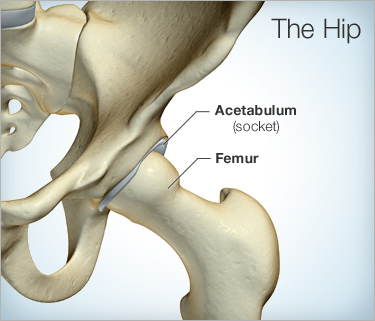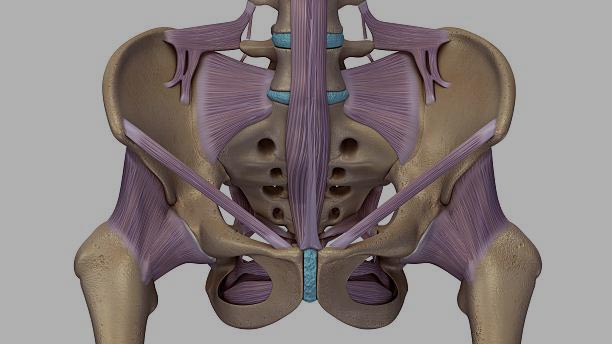Hip Surgery to Restore the Joy of Movement
The most common reason for hip surgery is osteoarthritis, which occurs with gradual deterioration of the protective cartilage in the hip joint, and can lead to bone-on-bone contact. Patients with osteoarthritis may begin to notice pain or tenderness while they’re walking, loss of flexibility, and stiffness, especially in the morning.
Some Other Indicators for Hip Replacement Include:

- Rheumatoid arthritis, (a chronic inflammatory disease);
- Necrosis (death of the bone due to insufficient blood supply);
- Injury;
- Fracture (from falling, say);
- Or a tumor.
Your hip joint is designed like a ball joint. Located where the upper end of the thigh bone (femur) meets the hip (pelvic) bone is the femoral head. This roundish bone fits into a socket in the pelvis, which enables you to twist, pivot, dance or swing with a golf club.
In traditional hip replacement, the diseased bone and cartilage are removed, and the head of the femur and the socket (called acetabulum) are replaced with artificial parts. These parts are made of materials that allow a smooth, gliding motion.
Minimally invasive surgery requires a smaller incision but is usually reserved for younger, healthier patients.
Surgical patients can be released from the hospital within a few days, but full recovery can take up to six months, depending on the type of surgery and the progress of your rehabilitation.
Preparing for Hip Surgery is Essential to its Success.
Your medical team at All-Pro Ortho can give you exercises to help strengthen the muscles around your hip joint, and can also recommend some ways to temporarily alleviate the pain, with the help of medication, aides such as a cane or wheelchair, or special exercises.
Your orthopedic surgeon can explain whether surgery is the right option for you. If you decide to go ahead, it’s important to have realistic expectations. While most patients experience a decrease in pain and increased mobility, they are not advised to engage in or return to high-impact sports such as running or hockey.
Hip replacement, however, does allow most patients to participate in pain-free walking, swimming, golf, hiking, bicycling or dancing. If you are wondering whether you will be able to return to a favorite activity, you should discuss the specifics with Dr. Shaw before your surgery.
For general information about hip replacement surgery see the National Institutes of Health (NIH)web site.
Common Questions about Hip Replacement
How long does it take to recover from a hip replacement?
Recovery time for hip replacement surgery depends on a number of factors, such as your age, health condition prior to the surgery, as well as your lifestyle.
It is, however, generally possible to return to your normal day-to-day routine within 6 weeks, particularly light activities at home or in the office. Of course, it can take a few more weeks to return to high intensity activities like extreme sports.
Usually, at around 10 to 12 weeks following the procedure, most of the pain and swelling should be gone. You still need to have visits with your orthopedic specialist within the first year after your surgery.
What are the first signs of needing a hip replacement?
If you are experiencing recurring pain around your hips, this is a sign that you may need to consider getting a hip replacement. Additionally, increasing pain and discomfort following an injury, even after you’ve tried other treatments, can be a sign that surgery is necessary.
Another common sign is if your condition is affecting your daily life. For instance, limited mobility or feeling some instability in your hip joint may make normal activities such as standing and walking particularly challenging.
Consult with one of our experts here at All-Pro on whether it is time for you to consider hip replacement surgery.
Is a hip replacement a major operation?
Yes, while recovery period can only take a couple of weeks, it is still considered major surgery.
During the procedure, your doctor will make an incision to remove parts of the hip joint and replace them with an artificial implant or joint. You will also need to be placed under anesthesia.
For this reason, it’s generally advised to undergo hip replacement if other treatments have not worked for you and the pain you’re experiencing already has a noticeable impact on your quality of life.
How many hours does hip replacement surgery take?
It usually takes around two hours to complete the entire procedure. The total timeframe also depends on the condition of your hips as well as possible complications, though.
Additionally, you’ll spend some more time in the hospital before the surgery, where your doctor will prepare you and place you under their chosen method of anesthesia. After surgery, patients are moved to the recovery room until the anesthesia wears off. During this time, you will be closely monitored for any signs of complications.
What are lifelong restrictions after hip replacement?
Making sure that you take care of your hip following the procedure can help manage the longevity of your new hip.
Generally, among the activities you need to avoid would be participating in high impact activities that involve repetitive movement, such as jumping, weightlifting, and some sports. You may also want to refrain from bending your hips too much, or twisting movements.
Your doctor will go over any precautions that you need to observe, and it’s extremely important that you listen to their advice to make sure that you are not straining your body.
What is the best age for a hip replacement?
There is no specific age for one to consider hip replacement surgery, as it is dependent on several factors. However, it’s more common for those between their 50’s to 80’s to undergo the procedure. Some younger patients who went through trauma may also need the surgery.
Newer technological advancements have allowed for less invasive methods that also result in shorter recovery. Additionally, the materials used for implants have also evolved and now last longer.
Overall, if you are struggling with severe pain on a daily basis, you should not wait too long to get hip replacement surgery. At All-Pro, our experts can help assess whether it is time for you to do so.














